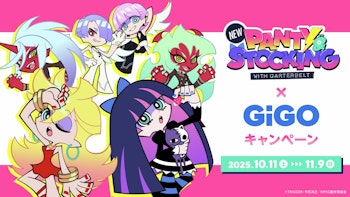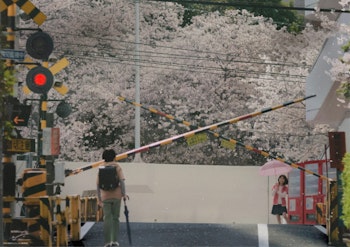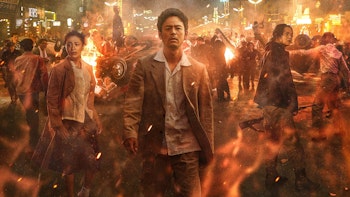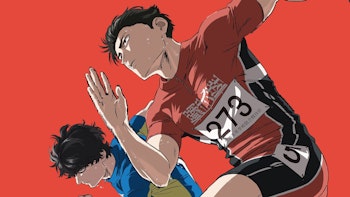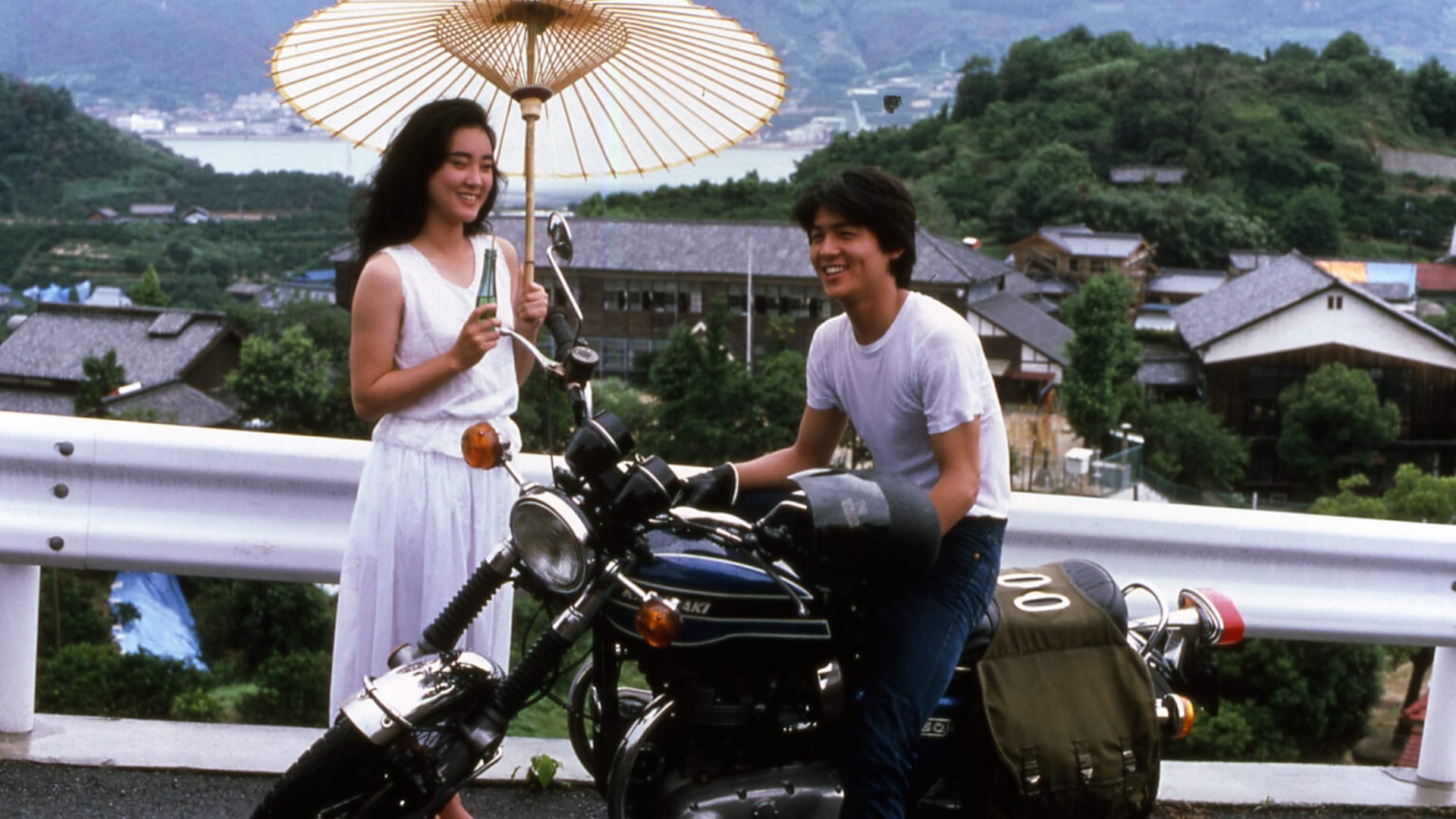
For a director most known for his efforts of abstraction - we’re talking films like House or his late-career anti-war trilogy where the heavy use of green screen remove the real world entirely to create dream-like landscapes for horror or introspection - one of the first things that stands out about Nobuhiko Obayashi’s 1986 classic His Motorbike, Her Island is just how grounded the film first appears. It flits between harshly-lit black-and-white flashbacks and memories with the colors of reality, but otherwise uses natural settings with a reverence for a nostalgia-laced biker culture. It’s also one of the more mesmerizing works of the director’s filmography too, expanding the definition of love in a fascinating exploration of the emotional core of romance itself.
His Motorbike, Her Island is a charged and masculine film at its core, abstracting sex and love to the colors of life and the roaring thrill of the motorbike. Ko (Riki Takeuchi) caresses his Kawasaki from the opening scene during his first ride through the early-morning streets like he’s stroking his hands across the bare skin of a lover, and it’s through his bike that he finds his sense of self and the women he becomes infatuated with. His fling with his former girl Fuyumi (Noriko Watanabe) came from his motorbike, a fascination and a not leading to their meeting which leads to them sleeping together. He fights with her protective brother over this love, the motorbike becoming the strength he uses before riding off to understand what to do with this relationship.
The trip leads him to meeting Miyoko Shiraishi (Kiwako Harada), a fascinating woman who thrills him by the attention she gives not just to him but his bike. She snaps their photo, she touches it with interest, and then teasingly leaves him be. The next they meet, after a ride through the rain and solitude from it inside an onsen, she witnesses the naked body of her in the same bath, unable to look away and overcome with feelings. His decision to end the relationship with Fuyumi and wholeheartedly pursue Miyoko is made.
One of Obayashi’s strongest traits across his filmography is his control over the medium. For all his use of green screen and VFX in his most renowned films can feel gauche, they never feel superfluous. They deliberately remove the films from their place in our world so that their ideas, dialogue, characters and themes come to the surface. Yet while these most famous films make use of this signature style, his ability to make even the everyday seem otherworldly, seen notably in his studio and eighties filmography, shouldn’t be overlooked, and they all come from how he weaponizes the idiosyncrasies of the format to his advantage.
The film shifts nonchalantly-yet-purposefully between monochromatic black-and-white and full-color to match the contrasting emotions and sexual tensions between these characters. With the colors bare it becomes almost like a dream, stripping away the world till only the two of them remain, lost in each other and their ability to ride with and as part of one another. The bikes become mere extensions of the self in such a context, like the love made manifest.
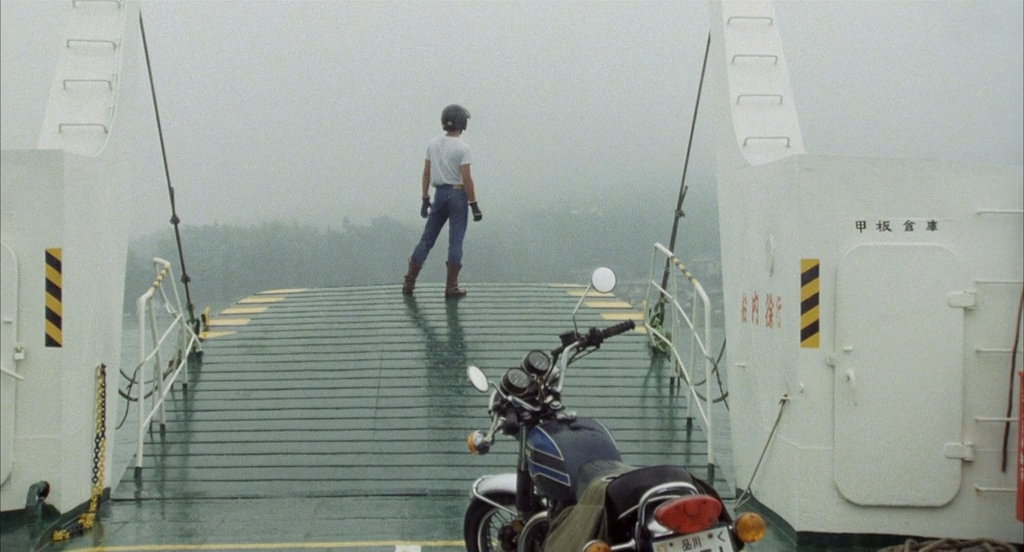
Rather than a pursuit of love, these 90 minutes become a tug-of-war between a love desired yet rushing and out-of-reach, driven more by emotion than context while paying tribute to the youth culture of the 1980s and the biker culture arguably at its peak both reminiscing its America-infused iconography with its community-driven Japanese present defined by a thrill absent from life otherwise. The bike is the manifestation of this, the road a metaphor more than anything tangible. Ko is defined by his bike more than his self, as others remark his freedom and sense of self while riding it and being enabled and loved by other riders and those he cares for.
It’s the core of the relationship: Miyako becomes interested less in him and more in the bike, encouraging her to ride to the point that the idea of the bike becomes what drives his interest in her till the bike consumes her thoughts entirely. To an almost-dangerous extent, their love is as carefree as it is reckless, the dangers that attract the leather jacket-laden people to the hobby being the thing that causes friction to them. It’s almost-etherial, beyond physical and into the emotional and theoretical rush of the ride. It’s the contrasts of biker obsession - the love of the machine with the recognition of the danger that could kill them yet only attracts them more - and it begins to define the two of them till its all too much.
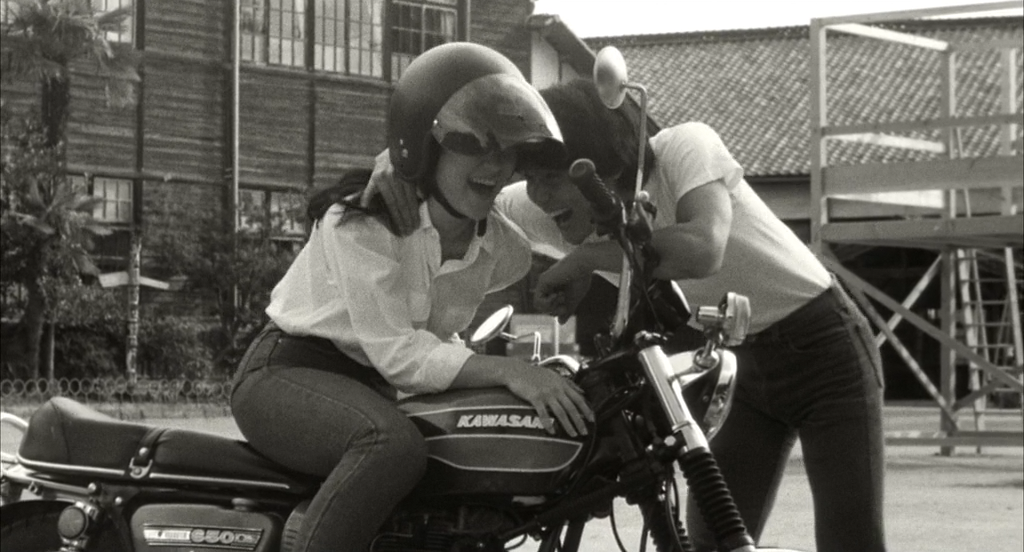
The hubris merges into the visual style of the film itself. You have the aforementioned cuts between black-and-white and color that mark a shift in whether the world is perceiving them or they perceive only their love through the person or the bike. It marks the barrier between dream and reality, often in flux and shifting multiple times a scene, jarring but never distracting or out of point. Combined with unusual cuts within the same shot that serve to emphasize the cracks between their normal interactions and the lustful vibrations of the bikes that drive their true love and freedom to a dangerous passion, its a use of form that elevates a simple romance to something far more carnal and primal.
Time itself begins to distort in these editorial choices, like a haste that the ride will speed away from them in the fleeting rain or the rush of wind. It serves contrast to the more soothing 1980s Japanese pop sound and more soothing classical tunes that are almost a distinct attempt from everything around this pair to slow the couple down before its too late. Most impressive is just how every element of the film serves just two purposes: lustful pleasure, and warning.
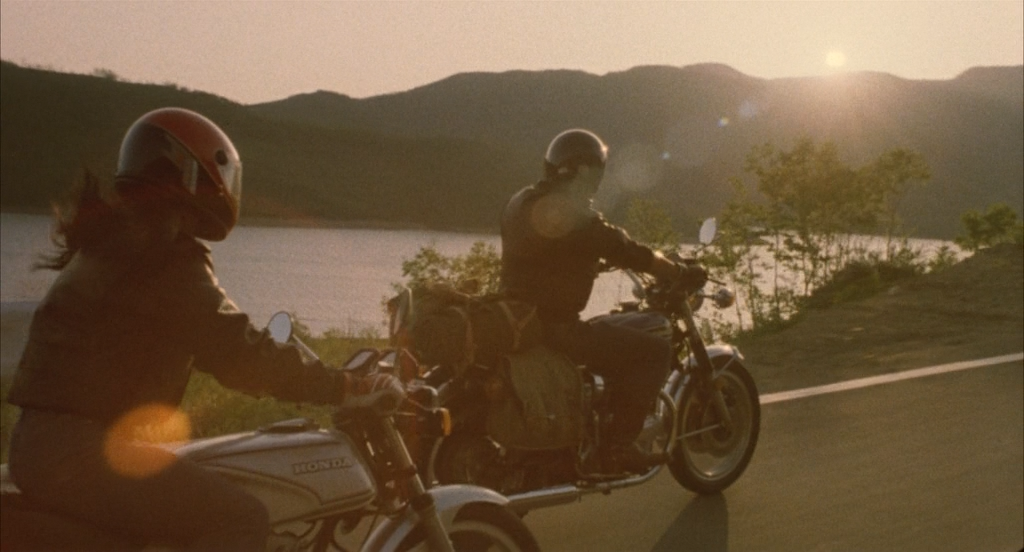
Stripped of its creative choices, you could argue that Nobuhiko Obayashi’s His Motorbike, Her Island is a simplistic, commercial motorbike-infused romance. Instead its a testament to the career of a masterful director, one whose astute awareness of the fact that film is not reality, and thus can be manipulated far beyond framing to manifest the deep-rooted emotions within 24 frames a second, allows them to represent humanity in its most base emotions. What makes film special is that the limitations of the format means it can capture reality but never look like reality, and few were able to take advantage of that and extrapolate that idea better than Obayashi.
His more famed works are perhaps the most extreme examples of this, but even a film like this shows this mastery in full effect.
scrmbl's Classic Film Showcase shines a light on historical Japanese cinema. You can check out the full archive of the column over on Letterboxd.



